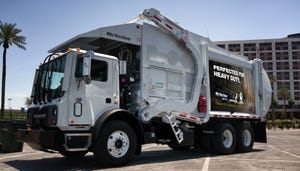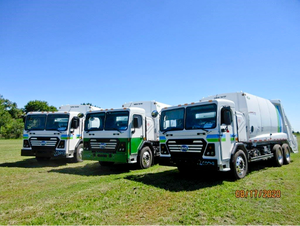FINANCING: Fund Creates Jobs, Revitalizes Communities
November 1, 1999
Anne Claire Broughton
Funding start-up and expansion efforts can be especially challenging for small recycling, remanufacturing and other environmental businesses. However, thanks to the new Durham, N.C.-based Sustainable Jobs Fund (SJF), it's now easier for these industries to gain needed capital.
The SJF aims at businesses that create quality jobs in economically distressed neighborhoods throughout the eastern United States. The fund focuses on sustainable industry sectors such as recycling and remanufacturing because they are suited to generate good jobs for low-income individuals.
Organized as a 10-year limited partnership, the fund is certified as a Community Development Financial Institution (CDFI) by the United States Treasury Department. Though still a new fund, SJF now has $9 million in capital commitment, the most recent of which was a $2 million award from the CDFI Fund in late September 1999. By early 2000, subsequent closings are expected to bring total capitalization to $15 million. In partnership with the Alexandria, Va.-based National Recycling Coalition, SJF has received $565,000 in foundation grants to conduct market research and provide technical assistance to companies.
Community development through job creation is a central goal of the SJF. "We anticipate the creation of more than 1,500 jobs as a result of the $15 million or more the SJF will invest during the life of the fund," says David Kirkpatrick, SJF co-founder and a managing director. "There will be related benefits in the form of neighborhood revitalization and positive environmental impacts."
This contrasts with traditional venture capital investing that typically funds fast-growing high-tech firms, which are located in the suburbs and mainly create white-collar jobs. According to PricewaterhouseCoopers, New York, in the second quarter of 1999, 76 percent of venture capital invested in the United States went to companies in the software-electronics, health-biotechnology and communications sectors.
"SJF focuses on fueling similar rapid job growth in less affluent urban and rural areas using community-development-oriented capital," says Sandra Walker, SJF northeast managing director. "Recycling and environmental businesses are proven job generators. These firms often are well-suited for the types of locations that most need jobs, such as urban Brownfields sites."
Recycling creates jobs for workers displaced from closed industrial plants in many inner cities. According to a city of Philadelphia report, their recycling-manufacturing sector generated job growth of 58 percent from January 1996 through June 1997. Overall manufacturing employment fell by 5 percent.
Recycling companies typically need large processing and manufacturing facilities with low-lease rates. Many have reclaimed old industrial and Brownfields sites. Urban locations place firms close to their supply of scrap materials. The type of work offered by the recycling industry allows employees with limited formal education to obtain entry level jobs with career advancement opportunities.
To be considered for funding, the SJF prefers businesses that add value to products through manufacturing. For example, a facility that manufactures plastic lumber from scrap plastic would meet SJF's criteria more than a processing plant that sorts bottles. It's also important that firms are located in economically-distressed areas of the eastern United States. Having the potential to create quality jobs for low-income individuals also is key.
Some of SJF's portfolio companies include R24 Lumber Co., Charlotte, N.C., and EMPower Corp., Everett, Mass. R24 Lumber manufactures two-by-four yellow-pine studs from scrap wood that would otherwise go to landfills. Remaining scraps from R24 Lumber's operation are ground into mulch and sold locally.
SJF's investment helped R24 leverage a Small Business Administration-guaranteed commercial loan, and the total financing package will allow R24 to expand and create 20 additional jobs for former low-income citizens.
EMPower manufactures the TranSPORT, a three-wheeled electric scooter that can carry a person 15 miles and reach 12 miles per hour with one battery charge. This scooter is designed as a cost-effective alternative to golf carts for transporting personnel in large facilities. With SJF and other equity investments, EMPower has created several manufacturing jobs.
The goal of SJF is to finance sustainable businesses that create quality jobs in distressed neighborhoods, with the hope that stronger businesses will help spur overall economic revitalization in the areas that need it the most.
To qualify for SJF consideration, companies should be able to answer "yes" to the following:
* Is your company located or planning a facility in an economically-distressed urban or rural area in the eastern United States?
* Will your firm create quality jobs for low-income individuals or welfare-to-work participants?
* Does your business need an investment or financing between $100,000 and $1 million?
* If you are seeking a growth or expansion investment, does your company have current sales and near-term profit potential?
* Do you have an experienced management team or are you recruiting one?
* Do your company's products and services have proven markets?
* Does your company have a business plan for sustained, profitable growth?
* Are you in the recycling, remanufacturing or other environmental sectors?
* Are you seeking a value-added investor with expertise in these markets?
SJF will consider companies outside those sectors which meet its other criteria.
Companies looking for investments from SJF generally fit into one of the following categories:
Seed Investments * Early or start-up companies.
* Average SJF Investment: $100,000 or more.
* Average company sales growing to $300,000 to $1 million in two to five years.
SJF Growth Investments * Young, operating companies.
* Average SJF Investment: $300,000.
* Average company sales begin at a few hundred thousand and growing to a few million in approximately four to five years.
SJF Expansion Investments * Growing, later-stage companies.
* Average SJF Investment: $1 million.
* Average company sales beginning at about $1 million and growing to several million within four to five years.
You May Also Like


